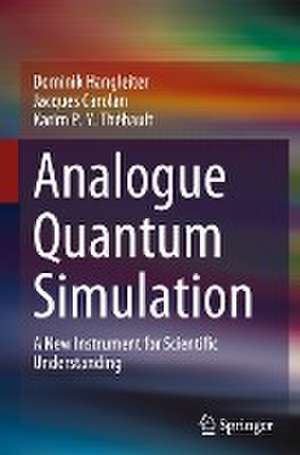Analogue Quantum Simulation: A New Instrument for Scientific Understanding
Autor Dominik Hangleiter, Jacques Carolan, Karim P. Y. Thébaulten Limba Engleză Hardback – 22 ian 2022
The analysis situates the various forms of analogue quantum simulation on the methodological map of modern science. In doing so, it clarifies the functions that analogue quantum simulation serves in scientific practice. To this end, the authors introduce a number of important terminological distinctions. They establish that analogue quantum ‘computation' and ‘emulation' are distinct scientific practices and lead to distinct forms of scientific understanding. The authors also demonstrate the normative value of the computation vs. emulation distinction at both an epistemic and a pragmatic level.
The volume features a range ofdetailed case studies focusing on: i) cold atom computation of many-body localisation and the Higgs mode; ii) photonic emulation of quantum effects in biological systems; and iii) emulation of Hawing radiation in dispersive optical media. Overall, readers will discover a normative framework to isolate and support the goals of scientists undertaking analogue quantum simulation and emulation. This framework will prove useful to both working scientists and philosophers of science interested in cutting-edge scientific practice.
Preț: 487.19 lei
Nou
Puncte Express: 731
Preț estimativ în valută:
93.23€ • 96.79$ • 77.74£
93.23€ • 96.79$ • 77.74£
Carte tipărită la comandă
Livrare economică 22 martie-05 aprilie
Preluare comenzi: 021 569.72.76
Specificații
ISBN-13: 9783030872151
ISBN-10: 3030872157
Pagini: 148
Ilustrații: XI, 148 p. 19 illus., 18 illus. in color.
Dimensiuni: 155 x 235 mm
Greutate: 0.4 kg
Ediția:1st ed. 2022
Editura: Springer International Publishing
Colecția Springer
Locul publicării:Cham, Switzerland
ISBN-10: 3030872157
Pagini: 148
Ilustrații: XI, 148 p. 19 illus., 18 illus. in color.
Dimensiuni: 155 x 235 mm
Greutate: 0.4 kg
Ediția:1st ed. 2022
Editura: Springer International Publishing
Colecția Springer
Locul publicării:Cham, Switzerland
Cuprins
1. Introduction.- 2. Distinctions with a Difference.- 3. Case Studies.- 4. Understanding Understanding.- 5. Methodological Mapping.- 6. Norms for Simulation and Emulation.- 7. Conclusion and Prospectus.
Notă biografică
Dominik Hangleiter is a Hartree Postdoctoral Fellow at the Joint Center for Quantum Information and Computer Science of the University of Maryland and NIST. In his research, he explores the computational potential of quantum devices from the perspectives of physics and computer science, and asks questions about the methodological foundations of science in general.
Jacques Carolan is a Research Fellow at the Neural Computation Lab at University College London, developing optical technologies for large-scale control and readout of neural circuits. Previously, he was developing on photonic technologies to accelerate quantum and classical computing.
Karim Thébault is an Associate Professor in Philosophy of Science at the University of Bristol. His research interests are principally within the philosophy of physics, with a particular emphasis on classical and quantum theories of gravity as well as various issues in general philosophy of science and the philosophy of the social sciences.
Jacques Carolan is a Research Fellow at the Neural Computation Lab at University College London, developing optical technologies for large-scale control and readout of neural circuits. Previously, he was developing on photonic technologies to accelerate quantum and classical computing.
Karim Thébault is an Associate Professor in Philosophy of Science at the University of Bristol. His research interests are principally within the philosophy of physics, with a particular emphasis on classical and quantum theories of gravity as well as various issues in general philosophy of science and the philosophy of the social sciences.
Textul de pe ultima copertă
This book presents fresh insights into analogue quantum simulation. It argues that these simulations are a new instrument of science. They require a bespoke philosophical analysis, sensitive to both the similarities to and the differences with conventional scientific practices such as analogical argument, experimentation, and classical simulation.
The analysis situates the various forms of analogue quantum simulation on the methodological map of modern science. In doing so, it clarifies the functions that analogue quantum simulation serves in scientific practice. To this end, the authors introduce a number of important terminological distinctions. They establish that analogue quantum ‘computation' and ‘emulation' are distinct scientific practices and lead to distinct forms of scientific understanding. The authors also demonstrate the normative value of the computation vs. emulation distinction at both an epistemic and a pragmatic level.
The volume features a range of detailed case studies focusing on: i) cold atom computation of many-body localisation and the Higgs mode; ii) photonic emulation of quantum effects in biological systems; and iii) emulation of Hawing radiation in dispersive optical media. Overall, readers will discover a normative framework to isolate and support the goals of scientists undertaking analogue quantum simulation and emulation. This framework will prove useful to both working scientists and philosophers of science interested in cutting-edge scientific practice.
The volume features a range of detailed case studies focusing on: i) cold atom computation of many-body localisation and the Higgs mode; ii) photonic emulation of quantum effects in biological systems; and iii) emulation of Hawing radiation in dispersive optical media. Overall, readers will discover a normative framework to isolate and support the goals of scientists undertaking analogue quantum simulation and emulation. This framework will prove useful to both working scientists and philosophers of science interested in cutting-edge scientific practice.
Caracteristici
Analyzes analogue quantum simulation philosophically Provides a framework to support the goals of scientists Useful to both working scientists and philosophers of science
